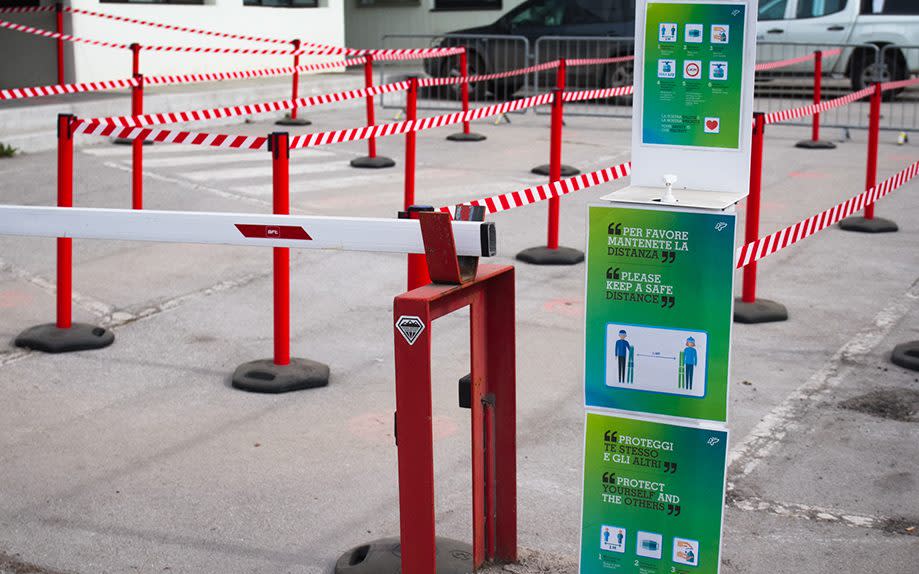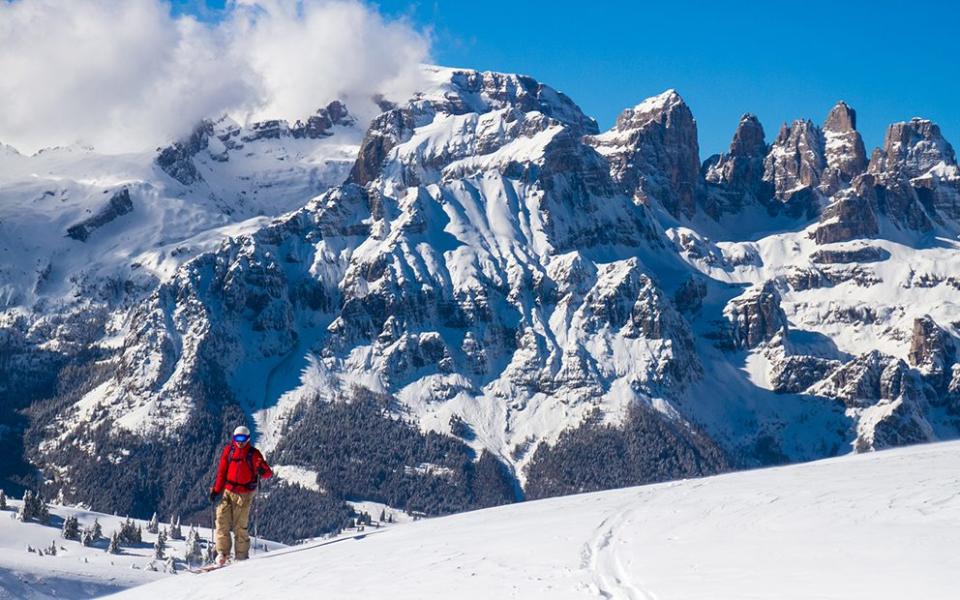A season of false starts: Italian ski resorts come to terms with a lost winter

“When you’re ready,” my guide shouts down to me, “I’ll climb that rock, drop off, and you can take the photo.” Simone Elmi, 53 going on 21, is in his element. About 20cm of fresh snow has fallen overnight and the sun is out. It’s a great day to be ski touring in the small Italian resort of Fai della Paganella. Unfortunately, he tells me on the skin track back up, occasions like this have been few and far between this season. “Most years, I would be guiding six out of seven days a week.” This year he’s lucky if it’s one or two.
For self-employed individuals like Elmi, the Italian government’s decision to keep ski lifts shut this winter has been hard. Across the north of Italy, where seasonal income from skiing is worth as much as €12 billion a year, the economic impact has been enormous. Gianni Battaiola, head of the regional hoteliers association in Trentino, the province around Paganella, estimates the knock-on effects on his and other industries are costing the region around €10 million euros per day.
It has been doubly frustrating, Battaiola says, because opening day was pushed back continuously, as case numbers stubbornly refused to fall. “It was December 5, then December 22, then January 7, then the 18th, then they said February 15. Now we will have the new government law which says you cannot open until Easter, so the season is finished”.
These constant changes have cost not just time, but money. In the run up to the winter, Luca Guidagini, the head of lift ops in Val di Fiemme, and the regional President of ANEF, the association of lift companies, says Trentino’s resorts were confident enough about reopening to spend more than €5 million on generating artificial snow. “Thankfully, excellent natural snowfall meant it wasn’t more,” he says. They also invested heavily in apps to count skier numbers, measures to reduce queues, and “automatic spray canons” that could sanitize every gondola within four seconds, he says.
As each potential opening day came and went, they geared up to go, reviewing and testing these new protocols, only to stand down at the last minute. “It was very frustrating for us, very frustrating for our partners, and very frustrating for our seasonal workers,” says Guidagini. “We promised to hire them, and then had to tell them ‘no’ as it was cancelled and cancelled.”

If the crisis has been tough on temporary residents, it has been difficult for the oldest too. Carlo Ghetta is Ladino, an ancient ethnic group from the Dolomites who speak their own language and have a reputation in Italy for resilience, and a hard work ethic. His family has been in the hospitality business in Val di Fassa for three generations, but no-one can remember a season as bad as this. They managed to open one of the three bars they own, The Picol, for a month when local restrictions relaxed in January. “But it wasn’t a pleasure to work,” he says. “Even when we could, it was hard, psychologically hard, because we were so empty.”
Of course, just because the après is non-existent, it doesn’t mean all forms of skiing have stopped. Travel may be banned, but locals have taken up ski touring as ‘essential exercise’ in record numbers.
In the shadow of an 18th-century church in Pinzolo, one of Madonna di Campiglio’s outlying villages, I find Eurosport, a small shop run by Laura Maganzini and her son Alberto, which specialises in ski touring gear. Bucking the trend, they’ve managed to sell “two or three times” the number of skis they would normally, according to Laura. “At one point it was impossible to get stock from the factories,” says Alberto. “Now they’re sending us next season’s models.” But if sales of backcountry equipment have gone some way to salvaging their winter, they haven’t plugged the gaps left by the drop in footfall.
Twenty minutes up the road in Campiglio’s main village sits the gleaming glass base station of the Fortini Express. This brand new, 10-person gondola, scheduled to open in December 2020, should be carrying up to 3,800 skiers an hour. So far, not a single tourist has set foot in its cabins. The turnstiles remain wrapped in protective plastic, and instead of the cheery ‘beep’ of liftpasses, the only sound is the steady drip of snow, melting in the unseasonably hot February sun.
For Maurizio Clementel, who owns the 23-room boutique Albergo Miravalle hotel in Fai della Paganella, spring can’t come soon enough. When Italy entered its first lockdown last March, some of his staff, who came from Moldova, found themselves trapped. With flights grounded and coaches cancelled, he and his wife Francesca, who works for the local tourist office, organised rescue buses to take them home. But then when things opened up last June, they came back, and he remembers a “relatively normal” summer, as the warmer weather allowed everyone to drink and dine outside, and restrictions were lifted.

In many ways, locals here know they’re lucky. Tourism in the Dolomites, where the focus is firmly on outdoor activities, is likely to bounce back more quickly than it would in Milan, London, or New York. There’s no need to queue for the Unesco World Heritage Sites here.
Mario Draghi’s newly-minted government is inspiring confidence too. He’s appointed a minister for tourism with real clout, and there’s a widely-held hope that as a former head of the European Central Bank, he will be effective when it comes to winning and distributing EU recovery funds. The long-term economic damage from a season of false starts is not yet clear, but this region’s chief asset, the world’s most beautiful mountains, are not going anywhere.
“It’s a shame more people haven’t been able to enjoy this,” Simone Elmi reflects, as we take skins off, and prepare to drop into another empty line. “But all the preparation means at least next winter, we’ll be ready.” In the meantime, he’s not about to let this fresh snow go to waste.


